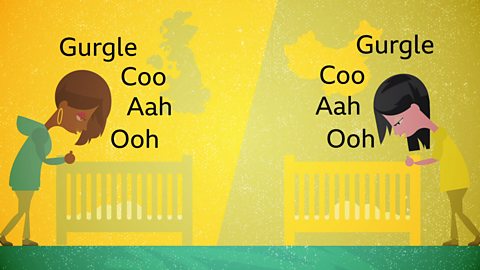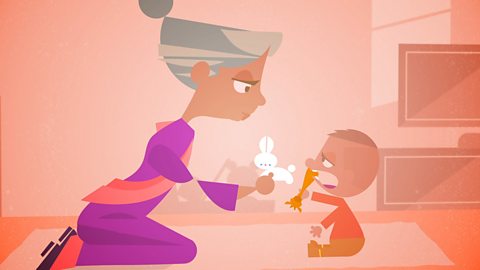Have you ever spoken in baby voice with your little one? And have you ever wondered why we do this?
Well, the good news is, not only does your baby love it, but it really helps with their early language development.
You don't need to use baby talk all the time but using simple sentences and repetition makes it easier for babies to learn and pick out new words.
Watch the short video explainer below to find out exactly why talking in baby talk, or parentese, is so great.
Do you speak in baby talk with your little one? And does it make you feel a bit silly sometimes? Does it?Well, the good news is, not only does your baby love it, it really helps them learn.
So, there’s no need to feel silly! Grown-ups naturally speak to babies in a high pitched, sing-song voice with slow speech, simple sentences and lots of repeated words. It’s called baby-talk,or parentese to be more scientific, though it’s also how some of us speak to pets!
It’s actually a great way for babies to learn language. Babies love the sing-song sound of parentese,which makes them much more likely to listen.
For instance, when scientists show infants images on a screen, they will look at them longer, when hearing baby talk than normal grown-up talk. And studies also show increased brain activity in babies hearing this kind of sing-song speech spoken to them.
The sing-song sound shows them where words and sentences begin and end, helping them pick out each word. And the simple sentences and repetition make it much easier for babies to learn.
You don’t have to do it all the time. Babies learn from hearing adults speak between themselves too. But baby talk is a great way to help your baby learn new words and sentences. So, go on, give it a go!

What is parentese?
Parentese is when you talk to your baby using slow tempo, higher pitch, but you use real words and correct grammar.
It exaggerates the length of words and is very rhythmic. We often refer to it as a sing song voice.
Other elements of parentese include using exaggerated facial expressions and repeating the same words or phrases over and over. You will probably sound like you're very happy when speaking in parentese.
Using parentese regularly with your baby can help speed up the development of their early language and social skills.
Adults naturally speak to babies in this way, so as a parent you don't have to worry about it too much. Just do what feels right and don't feel self-conscious.
Why is parentese good for language learning?
- Babies love the sing-song sound of parentese, which makes them much more likely to listen to you.
- By slowing down speech, you help them recognise where words and sentences begin and end.
- The short and simple sentences make it much easier for babies to learn new words.
- Hearing exaggerated sounds can help babies to learn the sounds of their own language.

The science of parentese
In one study, scientists showed infants images on a screen. They found that babies would look at the images for longer when they heard baby talk rather than normal grown-up talk.
This study also showed increased brain activity in babies hearing this kind of sing-song speech spoken to them.
Find out more about the science behind 'baby talk' and watch the experiment in action.






